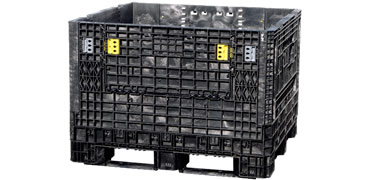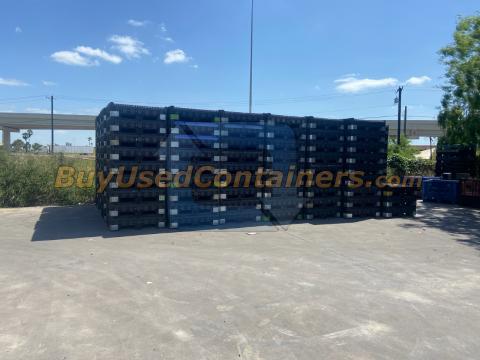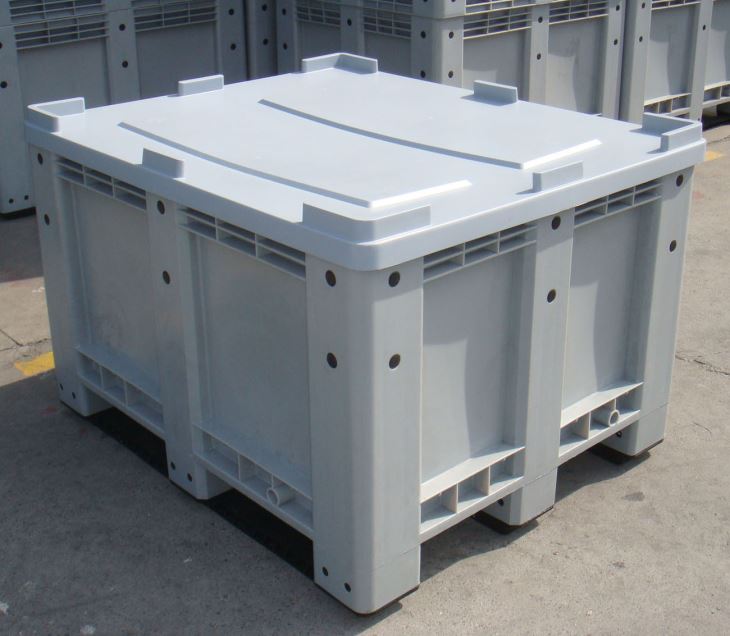The benefits of refurbished bulk containers in modern warehousing operations
Why Bulk Containers Are Essential for Sustainable and Economical Transportation
Mass containers play a vital role in modern-day logistics. They promote the effective motion of big quantities of goods, thus optimizing transportation procedures. This method not just decreases costs but also decreases ecological influence through reduced emissions and waste generation. As sectors look for more sustainable practices, the adoption of mass containers is coming to be progressively substantial. What implications does this change hold for future logistics and supply chain monitoring?

The Benefits of Making Use Of Mass Containers in Logistics
Bulk containers revolutionize logistics by improving effectiveness and sustainability. These containers permit for the transportation of large quantities of goods in a single trip, significantly reducing the variety of trips required. This not only enhances operations however also minimizes labor prices connected with handling, filling, and discharging. Furthermore, bulk containers are developed to optimize area usage within transport automobiles, ensuring that more items can be shipped concurrently.
The standardization of bulk containers additionally simplifies the logistics procedure. With consistent dimensions, they can be easily stacked and saved, resulting in enhanced stockroom administration. In addition, mass containers usually include durable materials that shield components from damage during transportation, thereby lowering product loss and boosting overall integrity. As a result, companies can experience enhanced supply chain performance, inevitably causing increased earnings and consumer satisfaction. This combination of factors makes bulk containers a crucial possession in modern logistics.
Environmental Effect: Decreasing Waste and Carbon Impact
As sectors increasingly prioritize sustainability, the adoption of mass containers has actually emerged as a vital method for minimizing waste and decreasing carbon footprints. These containers lessen the usage of packaging products, such as boxes and plastic, consequently significantly decreasing overall waste generation. By settling shipments, bulk containers boost transportation effectiveness, enabling for more products to be moved per journey. This decrease in trips directly associates with lower greenhouse gas emissions, contributing to a smaller carbon footprint.
Furthermore, bulk containers can commonly be reused or recycled, additionally reducing environmental influence. The durability of these containers warranties they can endure multiple transport cycles, minimizing the requirement for single-use alternatives. used collapsible containers. By simplifying logistics and promoting efficient source use, mass containers not just support lasting methods but additionally motivate industries to align with global ecological goals. Eventually, their application shows a commitment to environmental stewardship and responsible source monitoring
Cost Cost Savings: Exactly How Mass Containers Lower Transportation Costs
While many companies seek ways to enhance their lower line, the use of bulk containers provides a substantial possibility for decreasing transportation expenditures. Mass containers make best use of the volume of items moved, enabling businesses to ship larger amounts simultaneously. This effectiveness minimizes the number of trips needed, directly lowering gas expenses and lessening labor costs connected with loading and dumping.
Additionally, bulk containers commonly feature structured designs that optimize area utilization within transportation cars. This suggests fewer vacant rooms, leading to a lot more effective use offered ability. The resilience of bulk containers can lower the threat of item damage throughout transportation, lowering losses and guaranteeing that more goods arrive intact.
Enhancing Supply Chain Effectiveness With Mass Storage Solutions
Mass storage options play a necessary duty in boosting supply chain effectiveness by optimizing supply monitoring. By consolidating items right into fewer, bigger containers, businesses can greatly lower handling expenses connected with constant transfers and handling. This streamlined method permits for far better monitoring and management of stock, inevitably causing enhanced functional performance.
Structured Stock Monitoring
Efficient inventory management is necessary for optimizing supply chain procedures, particularly when organizations adopt bulk storage space solutions. These solutions allow companies to keep greater supply levels while decreasing the regularity of replenishment. By settling materials into mass containers, business can streamline their supply procedures, decreasing the complexity connected with tracking multiple smaller bundles. This technique assists in accurate inventory counts and boosts projecting precision, enabling more informed decision-making. On top of that, mass storage space services streamline storehouse organization, making it less complicated to situate and access products when needed. Because of this, companies can attain a more reliable stock turn over rate, inevitably improving general supply chain performance and lowering the possibility of stockouts or overstock circumstances.

Lowered Handling Costs
The implementation of mass storage solutions not just simplifies supply management yet additionally substantially lowers dealing with prices throughout the supply chain. By combining products into bulk containers, firms reduce the demand for regular handling and transfer in between check here different storage space and transportation systems. This method minimizes labor costs connected with loading, dumping, and moving smaller sized bundles. In addition, bulk storage space minimizes the frequency of shipments, resulting in reduced transport costs and decreased fuel consumption. Because of this, companies can enhance their logistics procedures, enabling a more reliable allotment of resources. Inevitably, decreased handling expenses add to boosted general supply chain efficiency, fostering an atmosphere that supports both sustainability and economic feasibility.

Convenience of Bulk Containers Across Various Industries
Although lots of markets have distinct requirements for transport and storage, bulk containers have actually emerged as a versatile solution that meets a variety of requirements. These containers, varying from big containers to specialized containers, can accommodate diverse products, including granules, fluids, and powders. In the farming sector, bulk containers assist in the transport of grains and fertilizers, while the food and beverage industry utilizes them for components and ended up items. The chemical industry depends on mass containers for securely moving harmful products, making sure conformity with security guidelines. In addition, construction companies gain from mass containers for carrying accumulations and other products. Their adaptability reaches various settings of transportation, including ships, vehicles, and trains, boosting logistical effectiveness. This adaptability not just streamlines operations throughout various industries however likewise promotes sustainability by reducing packaging waste and maximizing space en route. Mass containers play a crucial role in modern-day supply chain management.
Future Trends in Bulk Container Usage and Sustainability
The future of mass container usage is increasingly shaped by cutting-edge materials development that improves sustainability. Furthermore, automation in logistics assures to simplify procedures, reducing waste and improving effectiveness. Embracing round economic climate techniques will better reinvent exactly how bulk containers are designed, used, and recycled, cultivating an extra lasting transportation landscape.
Innovative Materials Development
As markets significantly prioritize sustainability, innovative materials growth wholesale containers becomes a significant consider improving eco-friendly transport solutions. Suppliers and scientists are exploring biodegradable plastics, recycled compounds, and light-weight steels to lower ecological effect. These materials not just decrease waste but additionally enhance gas efficiency by decreasing the overall weight of containers. Additionally, developments in wise products, which can adapt to differing conditions, improve the resilience and functionality of mass containers. The combination of these ingenious materials aligns with circular economic climate principles, promoting reuse and recycling. As the demand for sustainable techniques expands, the growth of such products will play an important role in shaping the future of mass container usage in logistics and transportation.
Automation in Logistics
Considerable advancements in automation are positioned to transform logistics and the utilization of bulk containers, improving sustainability in transportation. Automated systems, including drones and independent vehicles, are streamlining the movement of bulk containers, minimizing the dependence on standard fuel-powered transport. These technologies maximize transmitting and filling processes, decreasing empty miles and improving fuel efficiency. Additionally, automated supply monitoring systems enhance monitoring and monitoring of mass containers, ensuring much better source appropriation and decreased waste. The integration of the Web of Points (IoT) permits real-time data analysis, making it possible for proactive decision-making that lines up with sustainability objectives. As automation continues to develop, it is anticipated to drive better developments in mass container use, eventually sustaining more lasting logistics practices and decreasing the ecological influence of transportation.
Circular Economic Situation Practices
Advancements in automation are setting the phase for an extra incorporated approach to round economy techniques in the domain name of bulk container use. As sectors increasingly accept sustainability, mass containers are being designed for long life and reusability. This change not only minimizes waste but also improves resource effectiveness. Business are adopting methods such as closed-loop systems, where utilized containers are gathered, refurbished, and reintroduced right into the supply chain. In addition, smart modern technologies track container life cycles, assisting in much better management and lowering environmental impact. The cooperation between suppliers, logistics suppliers, and end-users is crucial in establishing requirements for sustainable container usage. used bulk containers. Future patterns suggest a growing emphasis on products that are biodegradable and recyclable, additional strengthening the round economic situation's concepts wholesale transportation

Often Asked Inquiries
What Products Are Bulk Containers Commonly Made From?
Bulk containers are commonly created from durable materials such as high-density polyethylene, aluminum, steel, and cardboard. These products offer security, strength, and versatility, making them suitable for moving various products in different sectors successfully.
Exactly how Do I Select the Right Size Mass Container?
Picking the appropriate size mass container entails examining the quantity of products to be moved, considering handling tools compatibility, and evaluating storage space requirements. Appropriate dimension assurances performance in transportation and decreases waste throughout delivery.
Are Mass Containers Reusable or Recyclable?
Bulk containers are commonly reusable, created for multiple journeys, improving sustainability. Several can likewise be reused, depending on the products utilized. Selecting recyclable options further supports ecological objectives and reduces waste in transport practices.
What Safety Laws Relate To Mass Container Transportation?
Safety and security laws for bulk container transport include compliance with the Department of Transportation guidelines, correct labeling of harmful products, structural stability evaluations, and adherence to weight limits to assure safe handling and avoid accidents throughout transit.
Just How Can Businesses Shift to Utilizing Bulk Containers Efficiently?
Companies can change to bulk containers by assessing present logistics, educating personnel on handling, buying appropriate devices, maximizing supply management, and working together with vendors to assure compatibility and efficiency throughout the supply chain.
As industries progressively focus on sustainability, the fostering of bulk containers has actually arised as a crucial approach for lowering waste and reducing carbon footprints. By combining products right into bulk containers, firms can streamline their stock processes, minimizing the intricacy associated with tracking multiple smaller plans. As markets significantly prioritize sustainability, cutting-edge materials growth in bulk containers arises as a substantial factor in enhancing environment-friendly transport solutions. Automated systems, consisting of drones and independent lorries, are simplifying the activity of bulk containers, lowering the reliance on standard fuel-powered transportation. In addition, automated inventory administration systems enhance monitoring and monitoring of bulk containers, guaranteeing much better source allowance and lowered waste.